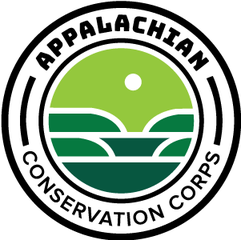The Importance of Telling Every Story
Individual PlacementsJuly 9th, 2023 | FREDERICK, MD – The Monocacy National Battlefield grounds looked like something out of the 1800s this past weekend, as park volunteers and staff donned Civil War-era clothes to educate the public on the Battle of Monocacy for its anniversary. Appalachian Conservation Corps interns took part in the event, from answering visitor’s questions at the front desk to helping set off a cannon during an artillery demonstration. The pair shared their thoughts on why public history helps benefit the future.
Brenna Hadley and Jared Ezrin posing at the Monocacy National Battlefield Visitor Center.
On July 14th, Monocacy National Battlefield kicked off its 159th anniversary of the Battle of Monocacy, also known as “the battle that saved Washington.” While this battle is less famous and smaller than the battles of Antietam and Gettysburg, it was crucial in the Union’s win. The battle delayed Confederate forces sent to capture the Nation’s Capital and ultimately forced them to withdraw to Virginia.
Monocacy National Battlefield preserves the site of the battle, which took place on July 9th, 1864, during the third and final Confederate invasion of the North.
The park held events all weekend for the anniversary, including infantry and artillery firing demonstrations, ranger programs, field music, and a battlefield tour. ACC interns Jared Ezrin and Brenna Hadley helped with the event, as part of their Resource Education and Visitor Services summer internships at the park.
Jared Ezrin posing during an artillery reenactment at Monocacy National Battlefield during its Battle Anniversary weekend.
A sighting tool used for Monocacy's artillery piece.
Brenna is an upcoming junior at Gettysburg College in southern Pennsylvania, where she is studying political science and public policy, and plans to continue on to law school. During her freshman year, Brenna took a first-year seminar class on Civil War memory from 1865 to present day. The class – which focused on society’s view of the Civil War and how that’s evolved over time – sparked her interest in public history.
“Because of the battle, we’ve gotten the opportunity to preserve this land and focus on all the other history that’s been here,” she said.
Last summer continuing into this summer, Brenna has been researching a group of migrant farm workers that lived on the battlefield during the 1970s and supported the canning industry in Frederick. Brenna said many people don’t know about groups like them, and her passion lies in highlighting those undertold stories in the community.
Most of her work has built upon research done by past National Park Service employees and volunteers, she said.
Jared is expanding on public resources available at the park during his internship. Many folks, such as his dad and sister, want to know every last bit of information surrounding historical events. Jared wants to write more specific accounts of what happened at each site for eager park visitors like his family. The extensive park library will serve as his database.
To him, it never feels like he’s walking into work. As someone who enjoys connecting with people, sharing his love of history with park guests is a dream come true, Jared said.
In addition to history, Brenna has a passion for nature and she appreciates the opportunity to connect with guests over both.
“It’s a beautiful place. We have great hiking trails and because of the battle we’ve been able to preserve that and make it available for everyone to use,” Brenna said, standing at the visitor center desk as park guests wandered around her.
A park volunteer talking to park guests after a live artillery demonstration at the battlefield’s anniversary event.
A park staff member talking to a young park visitor as guests step out onto the battlefield and check out the artillery.
Educating people on the nation’s history and past mistakes is important in securing a more peaceful future, Jared said. While our current day issues don’t look exactly the same, they can be quite similar.
For example, while slavery was banned following the Civil War, our country still has issues dealing with race relations, religious complexity and gender equality, Jared said. Educating ourselves on American history can help guide us in tackling current issues that mirror those in the past.
“And having places like this is a fantastic reminder of that,” Jared said.
To check out ACC’s open IP positions, visit our website at appalachiancc.org.





